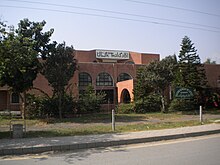Pakistan Academy of Letters
 |
|
| Abbreviation | PAL |
|---|---|
| Formation | July 17, 1976 |
| Legal status | A national academy in Pakistan |
| Purpose | Publication of literary and related works, promotion of authorship and literary exchanges. |
| Headquarters | PAL Secretariat |
| Location | |
|
Region served
|
Worldwide |
|
Official language
|
English and Urdu |
|
Chairman
|
Abdul Hameed |
|
Main organ
|
Pakistan Academy of Letters, Islamabad, and The Board of Governors |
| Website | http://pal.gov.pk/ |
The Pakistan Academy of Letters (PAL) is a national academy with its main focus on Pakistani literature and related fields. It is the largest and the most prestigious learned society of its kind in Pakistan, with activities throughout the nation. . It was established in July 1976 by a group of renowned Pakistani writers, poets, essayists, playwrights, and translators, inspired by the Académie Française.
After its founding in 1976 and as of 2016, Pakistan Academy of Letters remains a government-sponsored institution. It works under the jurisdiction of Ministry of Information, Broadcasting and National Heritage (Pakistan).
The poet Ahmed Faraz was appointed its first Director. It is an autonomous non-profit organisation, supervised by its own Board of Governors, receiving support from the Government of Pakistan as the apex national institution.
The Academy maintains several regional offices, and links with other national and international organizations of a similar status. Its agenda includes promotion of literary education, publication and documentation. with a view to promoting and fostering Pakistani literature, literary activities in Pakistan, and systematizing the support mechanism to writers and scholars of Urdu, Punjabi, Saraiki, Sindhi, Pushto, Balochi, English and other Pakistani languages.
In 1978, Ishtiaq Hussain Qureshi became the first Chairman of its Founding Fellows, among whom were prominent 'men of letters' representing different languages of Pakistan:
...
Wikipedia
